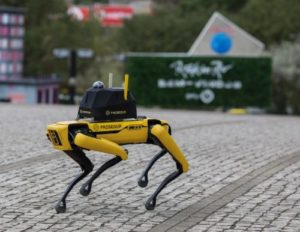Welcome to FindBiometrics’ digest of identity industry news. Here’s what you need to know about the world of digital identity and biometrics today:

Requests for Proposals
The Transportation Security Administration (TSA) has issued a request for proposals from contractors interested in providing the organization with Next Generation Credential Authentication Technology (CAT2) systems and support services. Essentially, the TSA wants a CAT2 system that confirms and displays passenger information, including flight reservation information and pre-screening status, to TSA operators, and that uses facial recognition to match travelers to their photo ID. Read our full story.
Biometric Border Screening
Biometric border screening has come to the Republic of Uzbekistan. Authorities with the country’s State Security Service have contracted a domestic firm to develop a biometric e-gate system that is now being launched at the Samarkand International Airport. The e-gates are designed to match travelers’ biometrics to their identity documents, and authorities are reportedly hoping the system will help to promote tourism in the authoritarian state.
The United Kingdom’s Home Office are in discussions with Albanian law enforcement officials to allow them to conduct biometric identity checks on Albanian nationals arriving at the port of Dover. The arrangement is part of a broader agreement established between the UK and Albanian governments that would see the former pay for a new police station at Rinas International Airport in Tirana and agree to classify Albanians’ asylum claims as “unfounded”. Albanian police officers will be permitted to collect the fingerprints of Albanians arriving at the UK border, and to see if they match against their own criminal databases.
BIPA Cases
Oak Point University, an Illinois post-secondary institution known for its nursing programs, will face a class action lawsuit over its use of remote testing software from Respondus Monitor. The software collected students’ voice and face biometrics to confirm their identities before proceeding with remote exams, a practice that is alleged to be in violation of the state’s Biometric Information Privacy Act.
Government Security
An independent study has determined that the hypothetical use of facial recognition to secure Parliament Hill, the seat of government in Canada, would pose privacy and human rights risks, and may be unlawful. The study was conducted by the Toronto Metropolitan University’s Leadership Lab after being commissioned by the Parliamentary Protective Service, which insists that it has no plans to implement facial recognition, but explains that it is exploring technologies that could help to thwart emerging threats.
Biometrics Research
Polaris Sensor Technologies has won a grant from the Alabama Innovation Corporation to aid its work in the development of an infrared facial recognition system that is capable of operating at distances of up to 500 miles in a range of lighting conditions. The exact sum has not been disclosed; the Innovate Alabama Supplemental Grant Program is doling out a total of $4.5 million in funding to 30 businesses across the state.
Smart Car Access
NXP Semiconductors has announced a new Secure Element designed specifically for smart car applications. The NCJ37x SE supports Car Connectivity Consortium protocols, and can facilitate applications such as smart car access via NFC, Bluetooth Low Energy, and Ultra-Wideband communications. Ultimately, it could let drivers store the digital keys for multiple cars on a single fob.
Onboarding
Darlington Building Society has contracted LexisNexis Risk Solutions to provide technology for customer onboarding and an improved “member portal” experience. The companies’ announcement made no mention of the biometric capabilities of LexisNexis Risk Solutions’ platform, but noted that its single API “integrates into over 50+ third party data sources to enrich risk decisioning.”
I, Doggo
Prosegur, a global security solutions provider, has announced a new quadrupedal security robot equipped with facial recognition technology. Characterized by the company as a “robot dog named Yellow”, the robot is designed to conduct security patrols, and is equipped with machine learning capabilities that Prosegur says allow it to adapt to any terrain. Its computer vision capabilities allow it to distinguish known individuals from potential security threats and, unlike a real dog, it cannot be distracted with strategically deployed snacks. Read our full story.
–
August 30, 2022 – by Alex Perala









Follow Us